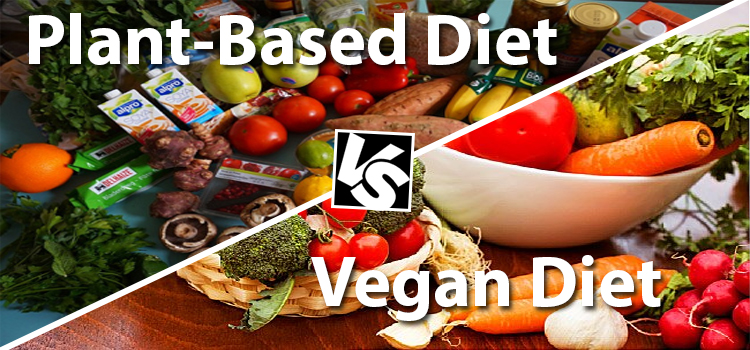Diets come and go like fashion trends. Among those, plant-based and vegan diet plans have been all the rage for the past few years. Celebrities, nutritionist, and millennials are obsessed with the two. These diets appeal to anyone wanting to live a healthy lifestyle. Not to forget that small environmental footprint has made them particularly appealing to millennials.
Both diets seem similar but they are not. Let’s dig deeper into each one:
What Is a Plant-Based Diet?
As the name implies, the focus of this diet is eating foods coming from plant sources. You may also include a small number of animal products. This excludes or minimizes eggs, dairy products, meat, and refined food.
The emphasis is one eating whole foods such as whole grains (oatmeal, barley, quinoa), vegetables, fruits, nuts and seeds and plant-based oils (canola, olive, avocado).
It’s a perfect diet for those who struggle with consistency. An important distinction is that plant diet comprises of whole foods since a lot of vegan food available on the market is processed.
What Happens When You Switch to a Plant Diet?
It’s interesting how our body reacts to plant-based food. The science at work here is pretty fast-acting. Within weeks, your body undergoes life-extending changes. You start losing weight, the cholesterol and blood pressure levels reduce, blood sugar stabilizes and you start feeling lighter and healthier than ever.
Since you are eliminating processed food from your life, your body just loves it. When fruits, veggies, whole grains, legumes, and nuts go inside your body, you get a supply of well-balanced nutrients. All those proteins, fats, carbs, vitamins and minerals leave a healthy impact on the body.
What Are the Pros and Cons of a Plant Diet?
Before switching to a plant-based diet, it’s important to know the consequences. Avoiding processed food requires a lot of meal prep and planning in advance. It’s tricky to get an optimal amount of nutrients and proteins when you are not eating meat.
Let’s observe the pros and cons of this diet:
Pros
- Improves heart health
- Reduces risk of diabetes and in some cases reverses type 2 diabetes
- Reduces chances of getting cancer
- Lowers BMI (Body Mass Index)
- Lots of variety of food
Cons
- Difficult to meet protein levels
- Plenty of meal prep and planning required
- Risk of developing nutrient deficiencies
Is Plant Diet Dangerous?
Good heart health and controlled blood sugar might be the perks but there are some risks of going on both plant-based and vegan diet regimes.
Firstly, it takes a toll on your brain health. Experts say plant diet results in a choline crisis, which is a nutrient critical for brain health. It’s found in meat and poultry. Since you are allowed to add animal products to your diet, taking a few eggs a week can boost the intake. If you want to eliminate meat, make sure you take a supplement as an alternative.
It also creates nutritional deficiencies, which nutritionists suggest can be recompensed by planning your meal.
How Do I Switch to a Plant Diet?
Switching to a plant diet is a great decision to stay fit and healthy. The transition isn’t easy though, especially if you are a meat lover. These tips have helped lots of beginners:
- Start slow
- Don’t go cold turkey instead, cut meat and processed food slowly
- Have a plant-based breakfast
- Choose fun and exciting meals
- Pay special attention to protein intake
What’s a Vegan Diet?
Vegan as well know excludes all animal products (meat, dairy, fish, poultry, honey, eggs, etc.). Many choose to follow vegan for ethical and environmental reasons rather than health concerns.
This diet is very different from the plant diet because even some form of vegan food can be unhealthy. For instance, if you are eating vegan cookies, chips and other forms of vegan junk, you are consuming high amounts of calories.
The vegan diet itself has so many subcategories starting from 80/10/10, thrive diet, raw food diet, whole food diet and so on. People are a big fan of its non-surgical weight loss benefits. Several studies prove this form of diet to be highly effective for losing weight than any other diet.
What Happens to Your Body When You Go Vegan?
This entirely depends on the type of vegan food you consume. If it’s a well-balanced diet, low in salt and canned food, your body will undergo a positive change.
In the first few weeks, you notice a great boost in energy. The diet automatically makes you think ahead about your meals and snacks rather than eating whatever is convenient. Your bowel function improves too thanks to the increase in fiber intake. Acne starts clearing up.
A cleansed diet like this reduces the risk of developing diabetes. There are so many other benefits. For instance, becoming a vegetarian helps combat an eating disorder.
What Are the Dangers of Being Vegan?
Before you decide to go all vegan, there are some consequences to watch out for. The biggest problem is vegans are at a lower risk of developing heart disease but a higher risk of stroke.
Your body may fall short of nutrients such as Calcium, Zinc, Iron, Vitamin D, etc. To prevent deficiencies, it is important to take supplements.
What Is the Life Expectancy of Vegans?
A study published in the JAMA Internal Medicine Journal reveals that vegans have lower death rates compared to meat-eaters.
This research was conducted at Massachusetts General Hospital. A diet of more than 130k people was monitored over 30 years. The results showed that a 3% increase in calories from plant protein can reduce death by 10%. Similarly, substituting eggs for plant protein reduced death risk by 19%.
Is It Better to Be Vegan or Meat Eater?
Speaking of a healthy lifestyle, meat might not be a problem. The culprit is a diet loaded with processed food (which can also be a part of your lifestyle if you are a vegan).
Veganism is healthier than the average meat eater’s diet. However, it’s not perfect since it lacks Vitamin B12, Calcium, Zinc, Iron and other vital nutrients.
It’s clear that among the plant-based and vegan diet, the first one is a healthier option if you combine a few animal products to cover up for protein, minerals, and other nutrients.
More Frequently Asked Questions
Read these frequently asked questions to break the stereotypes about the two diets:
Is a Plant-Based Diet the Same as a Vegan Diet?
No. A plant diet includes fruits, veggies, legumes, whole grains, etc. Some people also consider adding animal products to balance out the nutrients in their diet. Vegan, on the other, is against animal products in all forms.
Is a Plant-Based Diet Better?
Yes. It’s rich in fiber, water content (from fruits and vegetables), and carbs. People who primarily consume plant produce have lower BMI and are at a lower risk of developing diabetes, obesity, and heart-related problems.
How Do You Start a Plant-Based Diet for Beginners?
A sudden shift in a diet is not for everyone. Beginners must take it slow. Start by reducing the amount of processed food. Then, reduce the intake of animal products. Switch to plant-based breakfast. Cook delicious recipes to keep yourself motivated and develop consistency.
Why Do People Lose Weight on a Plant-Based Diet?
A plant diet is rich in whole grains, fruits, and vegetables which are a great source of fiber. It takes longer to digest. Studies show people with higher fiber intake have lower body weight. They tend to gain less weight over time.
How Can I Get More Protein Without Eating Meat?
Eat nuts and grains rich in protein such as peanuts, Greek yogurt, kidney beans, tofu, oats, pumpkin seeds, soymilk, quinoa, and lentils.




